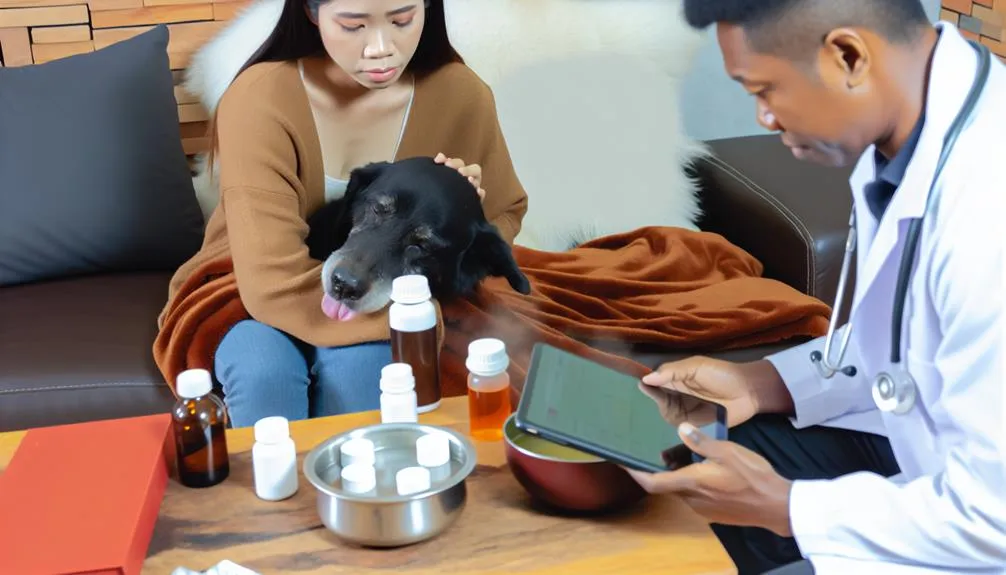
Do Dogs Get Stomach Bugs
Like the unexpected plot twists in a classic novel, your dog can also face the discomfort of a stomach bug. You might notice symptoms such as vomiting or diarrhea, which can leave you wondering about the cause and what to do next. It's crucial to understand that various factors, from diet to infections, can lead to these gastrointestinal issues. But what should you really watch for, and when is it time to consult a veterinarian? The answers may surprise you and could greatly impact your furry friend's health.
Understanding Stomach Bugs in Dogs
Understanding what's going on when your dog has a stomach bug is fundamental for their well-being. Stomach bugs in dogs can arise from various sources, including dietary changes and parasite infections. If you've recently altered your dog's diet, introducing new foods too quickly can upset their gastrointestinal system, leading to discomfort and potential digestive issues. It's important to shift gradually, allowing your dog's stomach to acclimate.
On the other hand, parasite infections are another common culprit behind stomach bugs. Common parasites such as Giardia or roundworms can invade your dog's intestines, causing inflammation and diarrhea. It's important to be aware of your dog's environment and habits, as exposure to contaminated water or feces can increase their risk of infection.
Recognizing these factors helps you take proactive steps in maintaining your dog's health. Regular vet check-ups can assist in early identification of any parasites and guarantee your dog's vaccinations are up to date. Additionally, incorporating a balanced diet tailored to your dog's nutritional needs can greatly aid in preventing stomach issues.
If you suspect your dog has a stomach bug, monitoring their behavior and dietary intake becomes essential. Maintaining a consistent diet and being cautious with treats can help mitigate digestive disturbances. Overall, understanding these aspects not only allows you to respond effectively but also fosters a healthier, happier life for your furry companion.
Common Symptoms to Watch For
When your dog has a stomach bug, it's essential to recognize the common symptoms that may arise. Watch for signs such as vomiting, diarrhea, lethargy, and a noticeable loss of appetite. Addressing these symptoms early can make a significant difference in your dog's recovery and overall well-being.
Vomiting and Diarrhea
Many dog owners have witnessed their pets experiencing vomiting and diarrhea at some point, and these symptoms can be alarming. It's vital to understand that these signs often indicate a gastrointestinal upset, which could arise from various factors such as dietary indiscretion, infections, or even stress.
When your dog vomits or has diarrhea, it's important to monitor their overall condition. Pay attention to the frequency and appearance of the vomit or stool, as this can provide valuable information for your veterinarian. Additionally, consider how your dog's recent meals align with good canine nutrition practices. A sudden change in diet or consuming inappropriate foods can easily trigger these symptoms.
Hydration importance cannot be overstated during these episodes. Vomiting and diarrhea can lead to rapid dehydration, especially in smaller breeds or puppies. Make sure your dog has access to fresh water at all times, and consider offering electrolyte solutions specifically designed for pets if they refuse to drink.
If your dog's symptoms persist for more than 24 hours or are accompanied by other concerns, consult your veterinarian for further evaluation and Treatment options. Early intervention can make a significant difference in your dog's recovery.
Lethargy and Weakness
After experiencing vomiting and diarrhea, your dog might also show signs of lethargy and weakness, which can be concerning for any owner. These symptoms indicate that your dog's body is fighting off an illness, and it's important to monitor their behavior closely. Lethargy is characterized by a noticeable drop in energy levels; your dog may be less active, uninterested in play, or reluctant to move around.
Weakness can manifest as difficulty standing, unsteady movements, or even a lack of coordination. It's vital to differentiate between normal tiredness after an illness and severe lethargy that may require veterinary attention. Keep an eye on your dog's overall demeanor and energy levels as part of your health monitoring routine.
If your dog's lethargy persists for more than a day or is accompanied by other concerning symptoms—such as Rapid breathing, cold extremities, or signs of pain—reach out to your veterinarian promptly. Addressing these symptoms early can lead to better outcomes and help your dog recover more swiftly. Remember, attentive monitoring of your dog's behavior is key to ensuring their health and well-being during this challenging time.
Loss of Appetite
A noticeable loss of appetite is a common symptom that can accompany stomach bugs in dogs. When your dog is feeling unwell, this appetite change often serves as a key indicator of distress. It can be triggered by various factors, including nausea, abdominal pain, or even stress. Recognizing these signs early can be vital in addressing your pet's health needs.
Here's a quick reference table to help you identify potential triggers for your dog's appetite loss:
| Loss Triggers | Possible Symptoms |
|---|---|
| Nausea | Vomiting, drooling |
| Pain | Whining, reluctance to move |
| Stress or anxiety | Hiding, excessive barking |
If you notice that your dog isn't eating or shows reluctance toward food, it's important to monitor for additional symptoms. Persistent appetite changes can lead to dehydration and further health complications. If your dog refuses to eat for more than 24 hours or exhibits severe symptoms, contact your veterinarian for guidance. Early intervention can make all the difference in your furry friend's recovery.
Causes of Gastrointestinal Distress

Gastrointestinal distress in dogs can stem from a variety of causes, each requiring careful consideration. One of the most common triggers is dietary changes. If you've recently switched your dog's food, even a seemingly minor adjustment can upset their digestive system. Dogs are sensitive to new ingredients, and an abrupt alteration can lead to symptoms like vomiting or diarrhea. It's important to introduce any new diet gradually over several days to minimize such risks.
Stress factors also play a significant role in gastrointestinal issues. Dogs can experience stress from various sources, including changes in their environment, loud noises, or the introduction of new family members or pets. Just like in humans, stress can disrupt normal digestive function, leading to stomach discomfort and distress. Recognizing your dog's stressors and providing a calm environment can help alleviate these symptoms.
Infections caused by parasites, bacteria, or viruses can also contribute to gastrointestinal disturbances. If your dog has been exposed to other animals or environments, such as dog parks or boarding facilities, they may be susceptible to these infections.
Lastly, underlying health conditions, such as pancreatitis or inflammatory bowel disease, can lead to chronic gastrointestinal distress. If your dog shows persistent signs of discomfort, it's important to consult your veterinarian for a thorough examination. Identifying the root cause of gastrointestinal distress is essential for effective treatment and ensuring your dog's overall well-being.
Diagnosing Stomach Issues in Dogs
Frequently, diagnosing stomach issues in dogs requires a thorough understanding of their symptoms and medical history. You'll want to observe your dog closely and take note of any unusual behaviors or changes in their routine. A detailed account can provide your veterinarian with essential clues about what's going on.
When evaluating your dog's condition, consider these key factors:
- Vomiting or diarrhea: Frequency and appearance can indicate various issues.
- Loss of appetite: A sudden change in eating habits may signal distress.
- Weight loss: This can result from prolonged stomach issues or dietary changes.
- Behavioral changes: Increased lethargy or irritability could suggest underlying problems.
- Recent stress factors: Changes in environment, like moving or new pets, can impact your dog's digestive health.
It's important to provide your vet with information regarding any dietary changes, as they may help pinpoint the issue. For example, introducing new foods too quickly can upset your dog's stomach. Additionally, stress factors, such as travel or changes in routine, can also contribute to gastrointestinal distress.
Your veterinarian may perform physical examinations, blood tests, or imaging studies to determine the exact cause of your dog's stomach issues. By working collaboratively and sharing extensive information, you can help guarantee your dog receives the most appropriate care. Remember, timely intervention can make a significant difference in your dog's recovery.
Treatment Options for Affected Dogs

How do you know what Treatment options are best for your dog suffering from stomach issues? First and foremost, it's important to consult your veterinarian for a proper diagnosis. Once you've identified the underlying cause, you can implement effective treatment strategies.
One critical area to focus on is hydration strategies. Dehydration is a common concern when dogs experience vomiting or diarrhea. Make sure your dog has access to fresh water at all times. In some cases, you might consider offering an electrolyte solution designed for pets, as it can help replenish lost fluids and minerals. If your dog refuses to drink, try using a syringe (without the needle) to administer small amounts of water directly into their mouth.
Next, dietary adjustments can play a significant role in recovery. Start with a bland diet consisting of easily digestible foods like boiled chicken and rice. Gradually reintroduce their regular food once their symptoms improve, and be cautious about sudden changes to their diet, as this can exacerbate stomach issues.
Keep an eye on your dog's condition. If symptoms persist beyond a day or two, or if you observe any severe signs like lethargy or blood in their stool, seek veterinary attention immediately. Remember, every dog is unique, and what works for one might not work for another. Being proactive and attentive will help guide you in making the best decisions for your furry friend's recovery.
Preventing Digestive Problems in Pets
To keep your dog from experiencing digestive problems, it's essential to stay ahead of potential issues by implementing preventive measures. Being proactive can help you maintain your pet's overall health and well-being. Here are some effective strategies for preventing digestive issues:
- Make dietary adjustments: Gradually change your dog's food if you're switching brands or types. This helps prevent gastrointestinal upset.
- Incorporate probiotics: Probiotic benefits include improved gut health and enhanced digestion. Consider adding a vet-approved probiotic supplement to your dog's diet.
- Maintain a consistent feeding schedule: Regular meal times can help regulate digestion and prevent overeating or scavenging.
- Monitor treats and snacks: Choose high-quality treats and avoid giving table scraps, which may upset your dog's stomach.
- Ensure proper hydration: Always provide fresh water, as dehydration can exacerbate digestive problems.
Frequently Asked Questions
Can Dogs Transmit Stomach Bugs to Humans?
While dogs can carry certain pathogens, the risk of human transmission is low. Maintaining proper dog hygiene, like regular baths and clean living spaces, greatly reduces any potential health risks for you and your family.
Are Certain Dog Breeds More Prone to Stomach Issues?
Think of a garden; some breeds flourish while others struggle. Certain breeds do have dietary sensitivities and genetic predispositions, making them more prone to stomach issues. Understanding these factors helps you nurture your dog's health better.
How Long Do Stomach Bugs Usually Last in Dogs?
Stomach bugs in dogs typically last a few days. Symptoms duration varies, but you should watch for dehydration. Treatment options include maintaining hydration and, if needed, consulting your vet for specific care recommendations.
Can Stress Cause Stomach Bugs in Dogs?
Isn't it fascinating how stress impacts your dog? Stress symptoms can disrupt digestive health, potentially leading to gastrointestinal issues. While not a direct cause, stress can certainly exacerbate underlying conditions, affecting your dog's stomach health.
Is There a Vaccine for Canine Stomach Bugs?
Currently, there isn't a specific vaccine for canine stomach bugs. However, maintaining your dog's overall health through vaccinations can enhance their immune response, indirectly supporting their resilience against gastrointestinal issues. Regular vet check-ups are essential for ideal canine health.
Conclusion
In summary, while your dog's stomach bug might seem like a minor hiccup, it can feel like an epic battle for their little tummy! Monitoring their symptoms and ensuring they stay hydrated is essential, as dehydration can strike faster than a lightning bolt. Don't wait too long; if those pesky symptoms persist, consulting a vet could be the difference between a quick recovery and a drawn-out ordeal. You're your pet's best advocate—stay vigilant and compassionate!
You may also like
Archives
Calendar
| M | T | W | T | F | S | S |
|---|---|---|---|---|---|---|
| 1 | 2 | 3 | 4 | 5 | 6 | |
| 7 | 8 | 9 | 10 | 11 | 12 | 13 |
| 14 | 15 | 16 | 17 | 18 | 19 | 20 |
| 21 | 22 | 23 | 24 | 25 | 26 | 27 |
| 28 | 29 | 30 | ||||
Leave a Reply